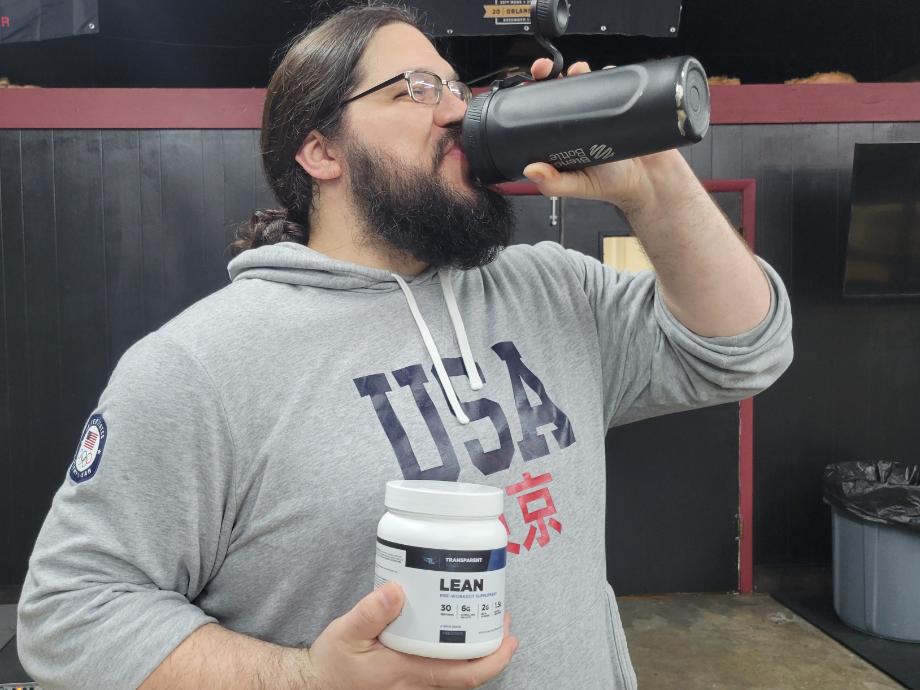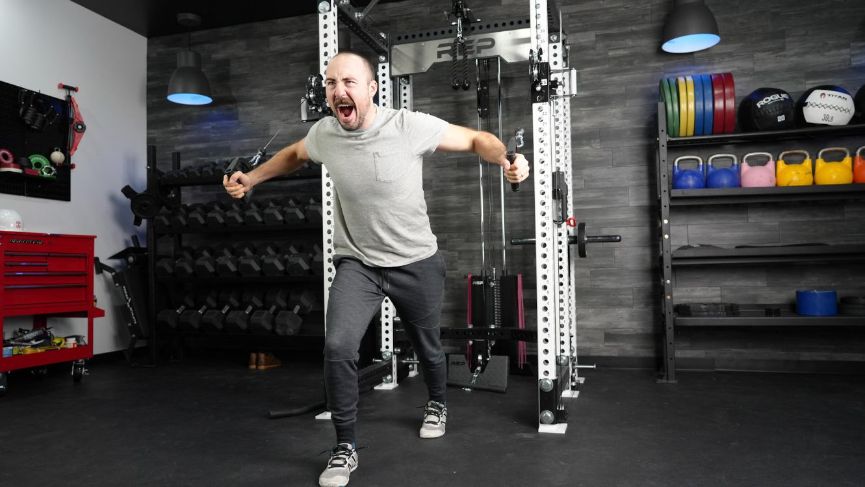If you walk into nearly any gas station, health store, or commercial gym, you’ll find no shortage of energy drinks, pre-workout beverages, and bottled coffee to power you through your day. There are endless options, and choosing between a high-quality pre-workout or a popular energy drink when your energy levels drop can feel overwhelming.
While there may be a lot of overlap between the different types of energy boosters, and both may help improve athletic performance and provide a quick energy boost, they serve different purposes and you should use them accordingly. There’s no right or wrong answer to the pre-workout vs. energy drink debate, so in this article, I—a nutrition coach—will explain the key differences between the two, and help you decide which is best for your goals.
Benefits of Using a Pre-Workout or Energy Drink
First, let’s examine the differences between pre-workouts and energy drinks. They aren’t the same, but they share similar benefits, and if you’re feeling sluggish during the day, either option can provide a nice energy boost.
With the exception of the best stim-free pre-workouts, both pre-workouts and energy drinks are typically powered by caffeine—with assorted ingredients that may provide additional benefits. As they both use caffeine, I’ll start by looking at a few of the ways these performance-enhancing stimulants can help you reach your fitness goals.
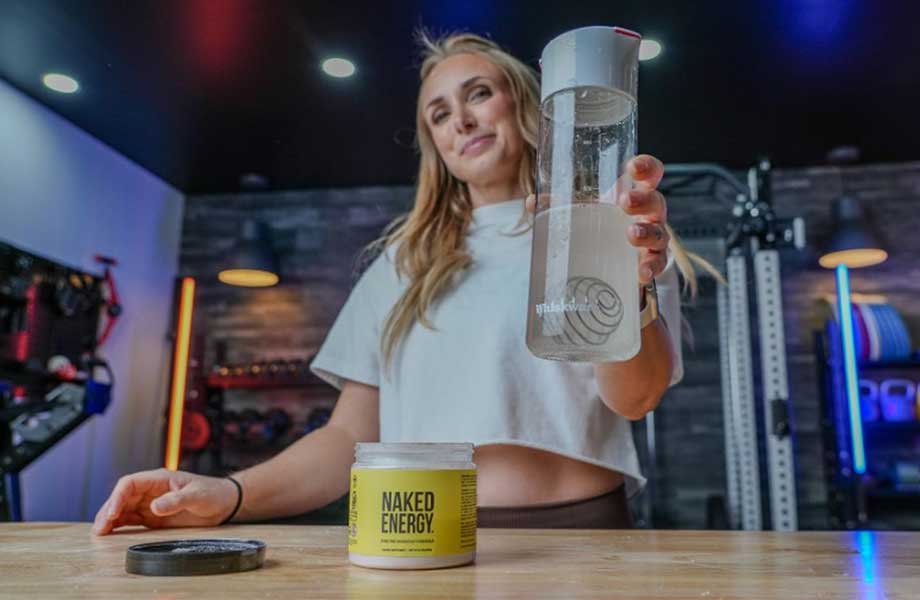
But before I dive in, it’s worth noting that pre-workout supplements often have a higher caffeine content than energy drinks, though the exact amount will depend on the product you’re using. This isn’t necessarily bad, but too much caffeine can increase your heart rate and blood pressure and give you the jitters. So, if you’re caffeine-averse, you’ll want to speak with your healthcare professional if you’re experiencing negative side effects.
Many formulas may also include additional stimulants beyond caffeine, like green tea or guarana. Carefully read the label before use, as you may take in more stimulants than you realize, and consult with a nutritionist if you’re unsure which ingredients are best for you.
Helps Improve Energy
First, it’s clear from research that caffeine can help improve your energy levels1. If you find yourself dozing off at work, a strong cup of coffee may be just what you need to jolt your brain into staying alert for the rest of the day.
Unless you’re using a stim-free option (or drinking decaf coffee), pre-workout formulas and energy drinks may provide a burst of energy from the caffeine content and additional stimulant-based ingredients.
RELATED: Coffee vs. Pre-Workout
May Help Improve Focus
In addition to helping you feel more energized, energy drinks and pre-workout powders can help boost your mental focus and provide a nice pick-me-up. Whether you’re finishing up an important project at work or want to stay focused on training at a busy gym, improved mental focus is always a nice benefit.
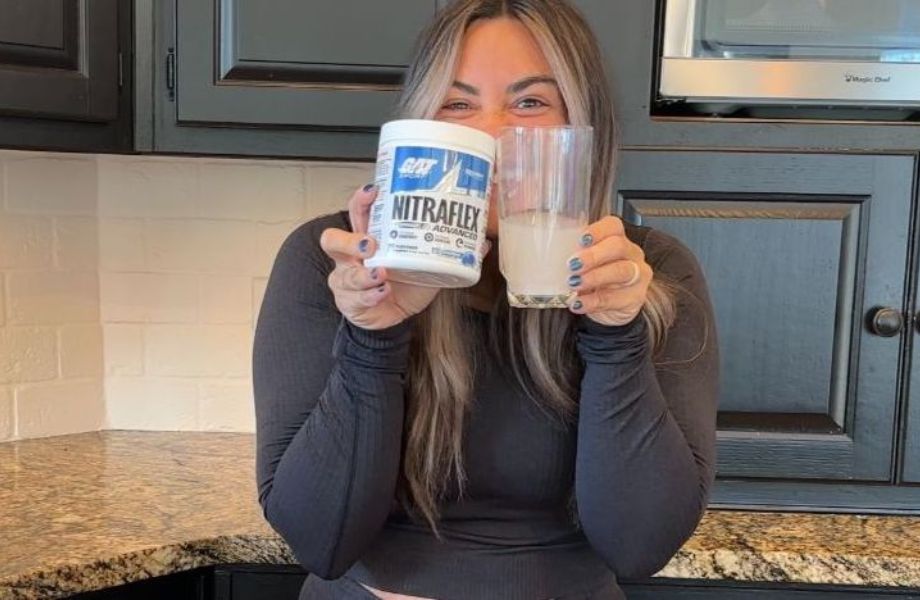
These benefits often come from ingredients like L-theanine, an amino acid shown to improve cognitive function2 when paired with caffeine that’s commonly added to energy drinks and pre-workout supplements.
May Help Improve Gym Performance
Finally, caffeine has been shown to improve muscle strength and power output3 in the gym. This can be dose-dependent and, as that study concludes, may be more pronounced in men than women.
If you have a high caffeine tolerance, you may not feel much from caffeine alone, but many pre-workout formulas contain additional ingredients that may improve muscular endurance in the gym4.
What’s the Difference Between Pre-Workouts and Energy Drinks?
Now that I’ve established that energy drinks and (most) pre-workouts contain caffeine, I’ll explore the differences, such as additional ingredients added for extra benefits and the doses of said ingredients.
While there are exceptions, most energy drinks are focused on mental performance and energy in your daily life, while pre-workouts focus on physical benefits that may help you in the gym.
RELATED: Does Pre-Workout Build Muscle?
Energy drinks commonly contain additional stimulants or ingredients that claim to boost mental performance and focus, and many energy drinks have a high sugar content.
Pre-workouts tend to use ingredients that delay muscular fatigue, improve blood flow, and improve strength and power output (to name a few potential benefits), but these ingredients can cause mild side effects. Generally, pre-workouts are made for fitness enthusiasts and tend to use artificial sweeteners rather than sugar, though each formula will be slightly different.

Energy drinks boost your brain, while pre-workouts boost your body, and both typically contain a significant amount of caffeine.
Common Pre-Workout Ingredients
Here are some of the most common ingredients found in a good pre-workout formula. These are general guidelines, however, as some energy drinks may contain the same ingredients.
Beta-Alanine
Beta-alanine is usually included to improve muscle endurance, and taking 4 to 6 grams per day5 helped increase exercise performance. It often causes paresthesia, a harmless condition that causes the tingly, itchy feeling that many people experience after drinking a pre-workout with beta-alanine.
Creatine
Creatine is one of the most well-researched sports performance supplements used to help increase energy, strength, and muscle growth. Many pre-workouts contain creatine, though it may be less than the recommended 3 to 5-gram dose.
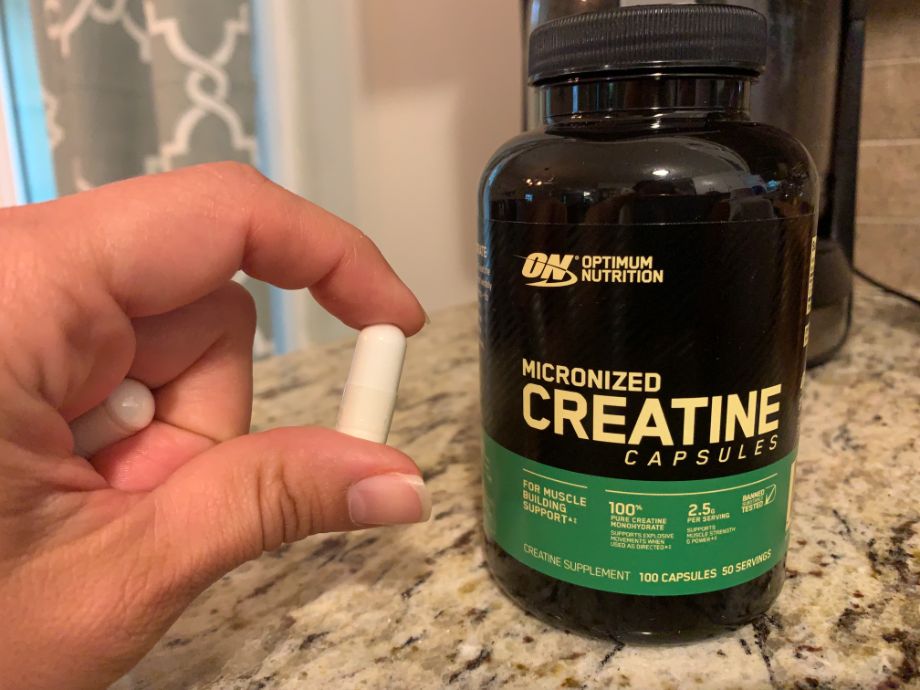
RELATED: How Much Creatine Should You Take?
Citrulline/Citrulline Malate
Citrulline is often added to pre-workouts to increase the body’s production of nitric oxide, which can help improve blood flow by dilating the blood vessels. You’ll often see this in “muscle pump” formulas, and the recommended dose is 6 to 8 grams6 per day to improve physical performance.
BCAAs
Some, but not all, pre-workout ingredients include branched-chain amino acids, or BCAAs, which may help support muscle recovery from training. You may also see other essential amino acids in your pre-workout.

RELATED: What Are BCAAs?
Common Energy Drink Ingredients
Energy drinks tend to have their own unique ingredients to give you a boost of energy, though they may also have some of the popular ingredients commonly used in pre-workout supplements.
B-Vitamins
Various members of the vitamin B family are an important part of energy production7 in the human body, and many energy drinks include various B vitamins to help provide an additional boost.
Alpha-GPC
While this isn’t common, many newer energy drinks that market themselves specifically to promote mental focus and cognitive function include Alpha-GPC, a compound that claims to improve focus and mood. A recent 2023 meta-analysis8 found that Alpha-GPC improved cognitive performance compared to a placebo, but many users, including myself, have never felt much benefit from this compound.
Taurine
Taurine is a naturally occurring amino acid found in animal proteins, and it’s associated with energy production. Some research has shown mixed results on physical performance, but a 2023 study9 found that taurine may have beneficial cardiovascular effects.
Guarana
Guarana is a plant that produces seeds that look a bit like coffee beans, and similar to coffee, guarana naturally contains caffeine and is often used in various energy drinks. However, a 2023 study found that while guarana provided a small boost in cognitive function10, it was unclear if that was due to the caffeine content or unique compounds in the guarana.
Side-By-Side Comparison
To show how ingredients can vary between energy drinks and pre-workouts, here’s a side-by-side comparison of the ingredients in a popular pre-workout, Legion Pulse, and a Ghost energy drink.
| Legion Pulse | Ghost Energy Drink | |
| Caffeine | 350 mg | 200 mg |
| Sugar | 0 g | 0 g |
| Beta-alanine | 3.6 g | 0 g |
| L-theanine | 350 mg | 0 g |
| Taurine | 0 g | 1 g |
| Citrulline | 8 g | 1 g |
| Alpha-GPC | 300 mg | 150 mg |
| Coffee fruit extract | 0 mg | 100 mg |
| Astragalus root extract | 0 mg | 25 mg |
How To Choose Between a Pre-Workout and Energy Drink
Now that I’ve covered the difference between the two, including the most common ingredients in both options, there’s one final question you should ask yourself to decide which option to go with.
What’s Your Goal?
The most obvious question to consider is what your goal is. Both options are similar and usually contain caffeine, but the extra ingredients may help you decide which to use.
If you’re looking to feel more alert at work, stay awake late into the night, or improve your focus while studying, an energy drink is probably the better choice. You’ll feel alert and won’t notice the physical effects like improved blood flow and delayed muscle fatigue, which you probably don’t need while sitting at work.
I asked GGR’s Head of Content, Nicole Davis, a certified nutrition coach, what she thought about using pre-workouts as an energy drink throughout the day. After all, it may seem more convenient to quickly mix up a pre-workout in a shaker cup at your desk rather than hunt down an energy drink.

“Because pre-workouts have additional ingredients like l-citrulline, which boosts nitric oxide production; beta-alanine, which has been shown to improve muscular endurance (and provides those tingles); and even betaine anhydrous, which can improve power output, replacing your energy drink with one during the day, say to concentrate on work, won’t be beneficial. If you’re looking for something to help you focus or give you a boost mentally, an energy drink makes more sense,” says Nicole.
However, if you are looking for those physical benefits to boost your workout, a pre-workout before you hit the gym will be a better choice to elevate your workouts to the next level. An energy drink can still improve your performance from the caffeine alone, but you’ll get more benefits out of a pre-workout formula.
RELATED: Should You Dry Scoop Pre-Workout?
Pre-Workout vs. Energy Drink: Final Thoughts
Overall, both pre-workout formulas and energy drinks can provide a nice burst of energy from caffeine—unless you’re using a stimulant-free formula. The caffeine can help keep you awake, sharpen your mental focus, and even improve your performance in the gym.
The main difference is the additional ingredients that cater to specific goals. If you’re following a weight loss diet that causes fatigue during the day or didn’t sleep well the night before, an energy drink provides a nice mental boost.
For those lifters looking for the ideal cocktail of ingredients to support their bodybuilding goals and maximize strength and muscle, a pre-workout may be the better choice. Overall, it’s probably best to use a pre-workout before exercise for maximum results, while energy drinks are better at improving mental focus throughout the day.
Pre-Workout vs. Energy Drink: FAQs
Is pre-workout better than energy drinks?
Pre-workouts aren’t better or worse than energy drinks, they’re meant for different goals. The additional ingredients in pre-workouts provide physical benefits, like improved blood flow and strength in the gym, while energy drinks tend to be better for mental focus and alertness.
Is it OK to take a pre-workout just for energy?
While it may not be dangerous, the ingredients in pre-workouts often impact your body, so you may feel jittery, tingly, or even a bit itchy if using beta-alanine. Depending on what you’re doing, these physical effects may be a bit distracting if you’re not going to work out.
RELATED: Pre-Workout Without Beta-Alanine
Does pre-workout really make a difference?
Yes, all pre-workouts use different ingredients, but the best ingredients in clinical doses can improve blood flow, delay muscular fatigue, improve strength and power output, and increase your mental focus.
RELATED: What to Look for in A Pre-Workout
References
- Guest NS, VanDusseldorp TA, Nelson MT, et al. International society of sports nutrition position stand: caffeine and exercise performance. J Int Soc Sports Nutr. 2021;18(1):1. Published 2021 Jan 2. doi:10.1186/s12970-020-00383-4
- Owen GN, Parnell H, De Bruin EA, Rycroft JA. The combined effects of L-theanine and caffeine on cognitive performance and mood. Nutr Neurosci. 2008;11(4):193-198. doi:10.1179/147683008X301513
- Mielgo-Ayuso J, Marques-Jiménez D, Refoyo I, Del Coso J, León-Guereño P, Calleja-González J. Effect of Caffeine Supplementation on Sports Performance Based on Differences Between Sexes: A Systematic Review. Nutrients. 2019;11(10):2313. Published 2019 Sep 30. doi:10.3390/nu11102313
- Harty PS, Zabriskie HA, Erickson JL, Molling PE, Kerksick CM, Jagim AR. Multi-ingredient pre-workout supplements, safety implications, and performance outcomes: a brief review. J Int Soc Sports Nutr. 2018;15(1):41. Published 2018 Aug 8. doi:10.1186/s12970-018-0247-6
- Trexler ET, Smith-Ryan AE, Stout JR, et al. International society of sports nutrition position stand: Beta-Alanine. J Int Soc Sports Nutr. 2015;12:30. Published 2015 Jul 15. doi:10.1186/s12970-015-0090-y
- Gough LA, Sparks SA, McNaughton LR, et al. A critical review of citrulline malate supplementation and exercise performance. Eur J Appl Physiol. 2021;121(12):3283-3295. doi:10.1007/s00421-021-04774-6
- Tardy AL, Pouteau E, Marquez D, Yilmaz C, Scholey A. Vitamins and Minerals for Energy, Fatigue and Cognition: A Narrative Review of the Biochemical and Clinical Evidence. Nutrients. 2020;12(1):228. Published 2020 Jan 16. doi:10.3390/nu12010228
- Sagaro GG, Traini E, Amenta F. Activity of Choline Alphoscerate on Adult-Onset Cognitive Dysfunctions: A Systematic Review and Meta-Analysis. J Alzheimers Dis. 2023;92(1):59-70. doi:10.3233/JAD-221189
- Santulli G, Kansakar U, Varzideh F, Mone P, Jankauskas SS, Lombardi A. Functional Role of Taurine in Aging and Cardiovascular Health: An Updated Overview. Nutrients. 2023;15(19):4236. Published 2023 Sep 30. doi:10.3390/nu15194236
- Hack B, Penna EM, Talik T, Chandrashekhar R, Millard-Stafford M. Effect of Guarana (Paullinia cupana) on Cognitive Performance: A Systematic Review and Meta-Analysis. Nutrients. 2023;15(2):434. Published 2023 Jan 14. doi:10.3390/nu15020434


